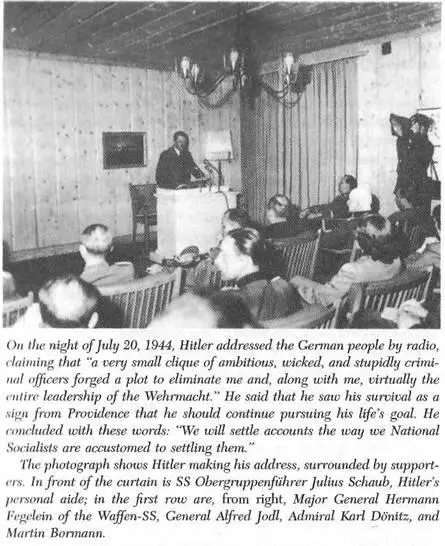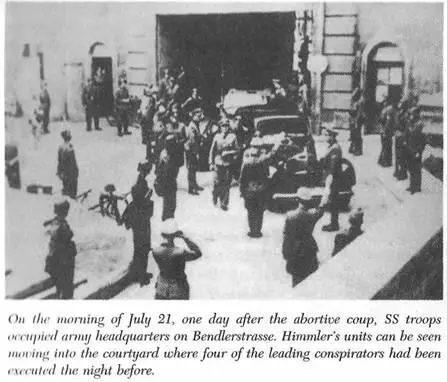In fact, however, Fromm proceeded much more decisively. Wasting no time, he placed the six main conspirators under arrest and demanded, pistol in hand, that they relinquish their weapons. Beck asked to keep his pistol “for private purposes,” to which Fromm replied gruffly, “Go ahead, but be quick about it!” Wishing to make a final statement, Beck raised his revolver to his temple and began, “I think now of earlier times-” But Fromm cut him off impatiently. “I told you, just do it!” he shouted. Beck paused for a moment and then, in front of several onlookers, squeezed the trigger. The bullet merely grazed his head. Fromm ordered two officers to take Beck’s revolver away, but Beck resisted clumsily, firing and wounding himself once again and collapsing in a heap-still alive.
Leaving the former chief of general staff dying on the floor, Fromm turned to the other conspirators: “If you wish to make a statement or write something, you can have a moment to do so.” Stauffenberg, Mertz, and Haeften remained silent, though Hoepner tried to assure Fromm that he had had nothing to do with the entire affair. Fromm remained unmoved. Only when Olbricht asked to be allowed to write a few lines did Fromm show some sign of compassion. “Come to the round table,” he said, “where you always used to sit across from me.” 20
But time was pressing. A unit of the guard battalion, it was reported, had arrived in the courtyard. Fromm must also have known that Himmler was on the way and that every one of the arrested officers, with the exception of Hoepner, was in a position to testify against him and had to be silenced. He therefore urged them again to hurry and finally declared, “In the name of the Führer, I have convened a court-martial that has pronounced the following sentence: General Staff Colonel Mertz, General Olbricht, the colonel whose name I will not speak, and First Lieutenant Haeften are condemned to death.”
Stauffenberg spoke out, claiming in a few clipped sentences sole responsibility for everything and stating that the others had acted purely as soldiers and his subordinates. Fromm said nothing in reply, merely standing aside so that the prisoners could be taken out. Glancing down again at Beck, who was still in his death throes, Fromm ordered an officer standing nearby to put him out of his misery. The officer refused, protesting that he was incapable of such an act, and passed the order along to a staff sergeant. The sergeant dragged Beck into an adjoining room and shot him. It was just after midnight.
In the courtyard outside, several military vehicles pulled up, their headlights glaring. Along all the sides of the square, groups of curious onlookers gathered. In the middle stood an execution squad consisting of Lieutenant Werner Schady and ten noncommissioned officers. As the prisoners emerged from the staircase, they were positioned in front of a small pile of sand. Olbricht was the first to be shot. Next it was Stauffenberg’s turn, but just as the squad fired, Haeften, in a defiant gesture, threw himself into the hail of bullets. When the squad again took aim at Stauffenberg, he shouted, “Long live sacred Cermany.” 21Before the sound of his voice died away, shots resounded. The last to die was Mertz.

Fromm immediately dispatched news of the executions by teleprinter: “Attempted putsch by disloyal generals violently suppressed. All leaders shot.” 22Then he descended to the courtyard, passed the crumpled bodies without a glance, mounted one of the vehicles, and delivered a rousing speech celebrating the Führer, his miraculous deliverance, and the works of Providence. He ended with three “Sieg Heils,” joined enthusiastically by the soldiers and onlookers.
Meanwhile Beck’s bloody body was being dragged down the stairs. It was thrown with the others into one of the trucks and carted to the nearby cemetery of St. Matthew’s Church in the Tiergarten. The custodian was instructed to inter the bodies secretly that very night, but the next morning Himmler ordered that they be exhumed and burned, and the ashes scattered “in the fields.”
The other conspirators at Bendlerstrasse-Schulenburg, Schwerin, Yorck, Berthold Stauffenberg, Robert Bernardis, Gerstenmaier, and others-were locked up in the old offices of Stauffenberg and Mertz. For a while it seemed as if another round of executions was imminent. Then, half an hour after midnight, Sturmbannführer Otto Skorzeny, who had been summoned to Berlin by Walter Schellenberg, arrived with an SS unit. Kaltenbrunner also appeared, as did Remer, who forbade all further executions. Skorzeny approached the prisoners and without a word tore off their medals and decorations and tossed them into a steel helmet on the floor behind him. Then the radio was switched on and the silent, heavily guarded prisoners were forced to listen to the speech that Hitler was delivering over all stations.
Satisfied with himself and convinced at the end of a long and confusing day that he had once again managed “to come down on the right side,” Fromm went off to see Goebbels. He wanted to be the first to report in person that the conspiracy had been crushed and the ringleaders executed. Then, perhaps, he would even deliver the news to Hitler himself. Instead, upon his arrival at Goebbels’s office, he was immediately arrested.
* * *
The collapse in Berlin was not the end of the coup. Particularly in Prague and Vienna the commanders of the military districts had carried out the instructions from Bendlerstrasse with considerable alacrity, arresting most SS and Security Service (SD) officials and occupying the main public buildings. Now they expressed their regrets to their captives, explaining that it was all a great mistake. The jailers and their erstwhile prisoners raised a few glasses together, and everyone departed.
In Paris the day’s events were much more dramatic. Around 2:00 p.m. Quartermaster General Eberhard Finckh, who had been privy to the secret plot, was alerted by telephone from Zossen that Hitler had been assassinated. About three hours later Stauffenberg himself came on the line to inform his cousin Cäsar von Hofacker that Hitler was dead and the uprising had begun. General Stülpnagel called a meeting of his officers, issued the prearranged orders, and distributed maps to the city commandant’s staff showing the residences of the two most senior SS and SD officials, Carl-Albrecht Oberg and Helmut Knochen, as well as the location of their units. The arrests were planned for 11:00 p.m. so as to cause as little commotion as possible.

While the preparations went ahead, Kluge contacted Stülpnagel and invited him to his headquarters in La Roche-Guyon. In view of the hopelessly superior firepower of the Allies, Kluge had come to share Rommel’s view that Germany could not hold out much longer. He therefore resumed wavering between halfhearted support for a coup and timid opposition. His hopes had initially been raised by the news from Bendlerstrasse but soon grew shaky with the denials from the Wolf’s Lair. After hesitating for a while between the conflicting reports from the two camps, he finally got in touch with Stieff, who confirmed that Hitler was alive and well.
When Stülpnagel and Hofacker arrived in La Roche-Guyon, Kluge, who was by then fully apprised of the situation, showed little patience for their passionate appeals and denied any knowledge of a conspiracy, commenting coolly, “Well, gentlemen, just a botched assassination attempt.” Stülpnagel and Hofacker argued that the apparent failure of the attempt only increased their own responsibility. The uprising could still succeed if the three of them refused to obey Hitler and unilaterally brought the war in the West to an end. But Kluge would not be swayed. Acting as if they had not just been discussing an issue of the highest importance, their last chance to avoid horrific devastation, Kluge invited his guests to a gracious candle-lit dinner, at which he droned on incessantly about his war experiences. His table companions stared glumly into space.
Читать дальше






![Traudl Junge - Hitler's Last Secretary - A Firsthand Account of Life with Hitler [aka Until the Final Hour]](/books/416681/traudl-junge-hitler-s-last-secretary-a-firsthand-thumb.webp)







